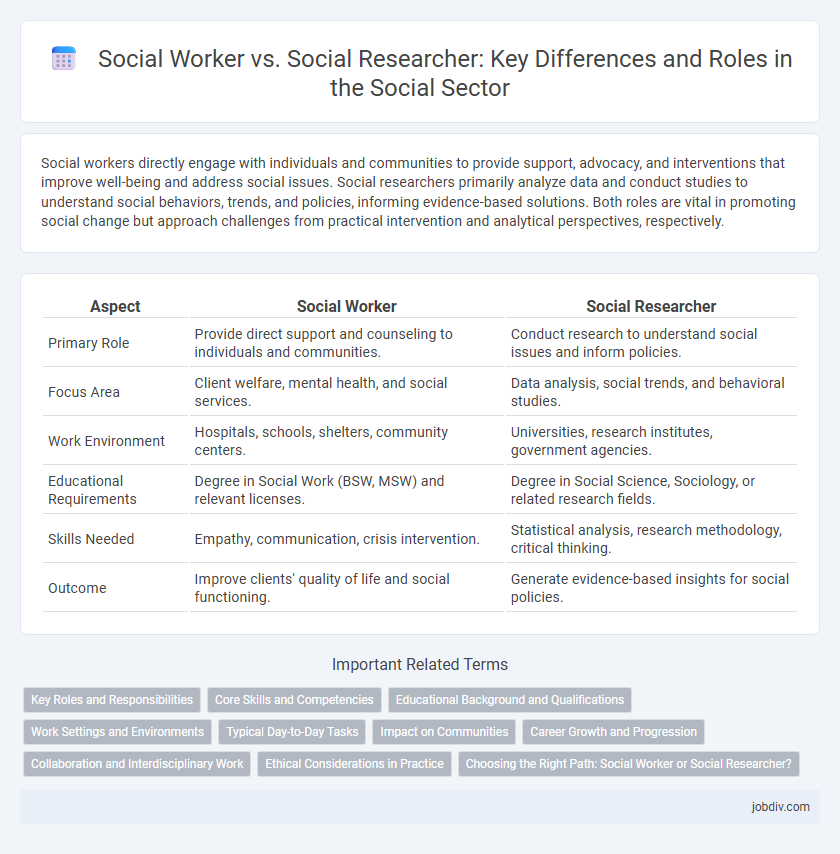Social workers directly engage with individuals and communities to provide support, advocacy, and interventions that improve well-being and address social issues. Social researchers primarily analyze data and conduct studies to understand social behaviors, trends, and policies, informing evidence-based solutions. Both roles are vital in promoting social change but approach challenges from practical intervention and analytical perspectives, respectively.
Table of Comparison
| Aspect | Social Worker | Social Researcher |
|---|---|---|
| Primary Role | Provide direct support and counseling to individuals and communities. | Conduct research to understand social issues and inform policies. |
| Focus Area | Client welfare, mental health, and social services. | Data analysis, social trends, and behavioral studies. |
| Work Environment | Hospitals, schools, shelters, community centers. | Universities, research institutes, government agencies. |
| Educational Requirements | Degree in Social Work (BSW, MSW) and relevant licenses. | Degree in Social Science, Sociology, or related research fields. |
| Skills Needed | Empathy, communication, crisis intervention. | Statistical analysis, research methodology, critical thinking. |
| Outcome | Improve clients' quality of life and social functioning. | Generate evidence-based insights for social policies. |
Key Roles and Responsibilities
Social workers provide direct support to individuals and communities by addressing personal challenges, advocating for resources, and implementing intervention plans to improve well-being. Social researchers design and conduct studies to gather data, analyze social issues, and inform policy development through evidence-based findings. Both roles contribute to social betterment, with social workers focusing on practical assistance and social researchers emphasizing data-driven solutions.
Core Skills and Competencies
Social workers demonstrate core skills in client advocacy, empathy, and crisis intervention, enabling direct support and empowerment of vulnerable populations. Social researchers possess competencies in data collection, statistical analysis, and research design, essential for generating evidence-based insights on social issues. Both roles require strong communication and ethical decision-making abilities to effectively influence social policies and practices.
Educational Background and Qualifications
Social workers typically hold a bachelor's or master's degree in social work (BSW or MSW), emphasizing practice-oriented training in counseling, case management, and community intervention. Social researchers usually possess degrees in sociology, psychology, or social sciences, with advanced qualifications like a master's or PhD focusing on research methodologies, statistics, and data analysis. Certifications for social workers include Licensed Clinical Social Worker (LCSW), while social researchers may pursue specialized research credentials or academic distinctions in their field.
Work Settings and Environments
Social workers primarily operate in community-based settings such as hospitals, schools, and social service agencies, delivering direct support to individuals and families in need. Social researchers are typically found in academic institutions, government agencies, and think tanks where they conduct studies and analyze social data to inform policy and practice. Both professions can overlap in NGOs and policy institutes, but their environments differ with social workers engaging face-to-face with clients while researchers focus on data collection and analysis.
Typical Day-to-Day Tasks
Social workers provide direct support by assessing client needs, developing care plans, and connecting individuals to community resources to improve well-being. Social researchers focus on designing studies, collecting and analyzing data, and interpreting social trends to inform policies and programs. Both roles require strong communication skills but differ in their emphasis on hands-on client interaction versus data-driven investigation.
Impact on Communities
Social workers directly engage with individuals and families to provide support, advocacy, and resources that improve mental health, safety, and well-being within communities. Social researchers analyze social issues by collecting and interpreting data to inform policies and programs that promote long-term systemic change. Both roles contribute significantly to community development, with social workers addressing immediate needs and social researchers facilitating evidence-based decision-making.
Career Growth and Progression
Social workers experience career growth through direct client engagement, specializing in areas like mental health or child welfare, often advancing to supervisory or management roles within social service agencies. Social researchers progress by developing expertise in data analysis, policy evaluation, and program development, frequently moving into senior analyst or academic positions in government, nonprofit, or academic institutions. Both careers offer pathways to leadership, but social workers prioritize hands-on practice, while social researchers focus on evidence-based policy and program improvements.
Collaboration and Interdisciplinary Work
Social workers and social researchers often collaborate to address complex societal issues by combining practical intervention strategies with empirical data analysis, enhancing the effectiveness of social programs. Interdisciplinary work involving psychology, sociology, public health, and policy studies allows these professionals to design holistic solutions tailored to diverse community needs. Joint efforts between social workers and researchers foster evidence-based practices that improve outcomes in areas such as mental health, poverty reduction, and social justice advocacy.
Ethical Considerations in Practice
Social workers adhere to strict ethical guidelines prioritizing client confidentiality, informed consent, and advocacy for vulnerable populations, ensuring direct positive impact on individuals' well-being. Social researchers emphasize ethical protocols regarding data integrity, participant anonymity, and the responsible use of findings to avoid harm and bias in social science studies. Both professions require ongoing ethical reflection to navigate complex social issues and maintain trust in their respective roles.
Choosing the Right Path: Social Worker or Social Researcher?
Choosing between a social worker and a social researcher depends on your passion for direct community engagement versus data-driven analysis. Social workers provide hands-on support to individuals and families, addressing immediate social challenges through counseling and resource coordination. Social researchers focus on studying societal trends, policies, and programs to inform evidence-based interventions and social change strategies.
Social Worker vs Social Researcher Infographic

 jobdiv.com
jobdiv.com